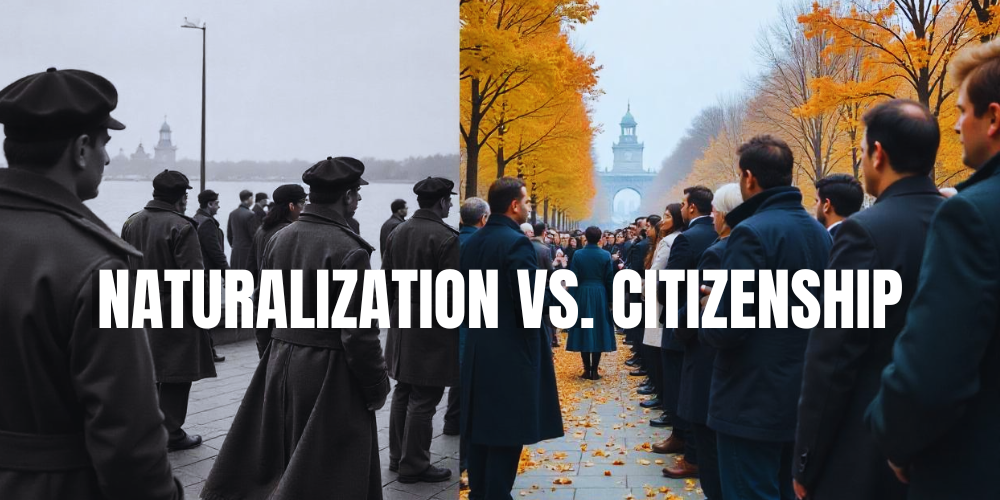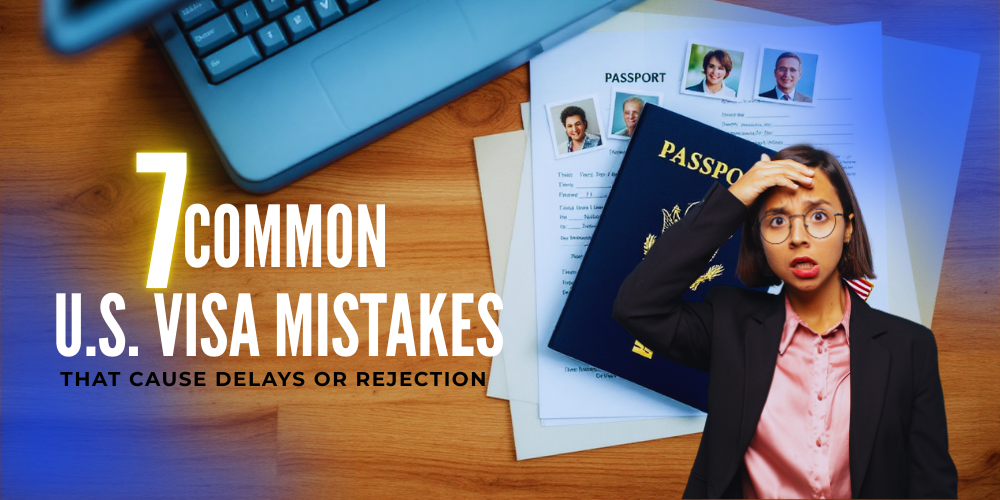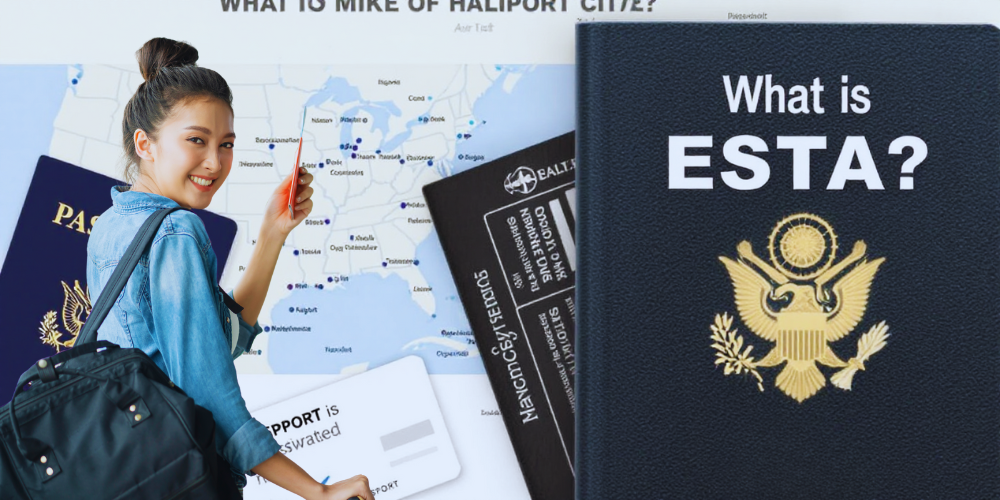--------- Naturalization vs. Citizenship: Rights, Responsibilities, and Myths Busted
May 19, 2025

Citizenship is the legal status that grants a person full rights and responsibilities within a nation. In the U.S., you can become a citizen either by birth or through naturalization. Though both forms grant equal legal standing, the paths and implications can differ significantly.
The concept of citizenship has evolved over centuries, from ancient Roman definitions to modern democratic rights. In the U.S., citizenship has always been central to one’s identity and participation in civic life, from voting to holding public office. Naturalization was formalized in the 18th century and has since become a vital pathway for immigrants seeking full integration.
Types of U.S. Citizenship
Citizenship by Birth
If you are born on U.S. soil or born abroad to U.S. citizen parents under certain conditions, you are a citizen from birth. This is known as “jus soli” (right of the soil) and is protected by the 14th Amendment.
Citizenship through Parents (Derivative)
Children may derive citizenship if their parents are citizens or become naturalized before the child turns 18 and meets specific residency requirements.
Citizenship through Naturalization
This is a legal process available to eligible immigrants. It requires fulfilling residency criteria, passing background checks, and demonstrating knowledge of English and U.S. civics.
What is Naturalization?
Legal Definition
Naturalization is the legal act or process by which a non-citizen acquires citizenship after birth. It's governed by the Immigration and Nationality Act (INA).
Eligibility Criteria
To apply for naturalization in the U.S., one must typically:
- Be 18 years or older
- Be a lawful permanent resident (green card holder) for at least 5 years (or 3 if married to a U.S. citizen)
- Demonstrate continuous residence and physical presence
- Show good moral character
- Pass the English and civics tests
The Naturalization Process Step-by-Step
- Application (Form N-400) Submission
- Biometrics Appointment
- Interview and Civics Test
- Oath of Allegiance Ceremony
Naturalization vs. Citizenship: Key Differences
Status at Birth vs. Acquired Status
Birthright citizens are automatically granted citizenship, while naturalized citizens must complete a legal process.
Documentation Differences
Birthright citizens have a birth certificate as proof. Naturalized citizens receive a Certificate of Naturalization, which serves as legal proof of status.
Impact on Rights and Privileges
In most respects, both types share equal rights, including voting and running for office (except presidency and vice presidency, which require natural-born status).
Legal Rights of Citizens (Born vs. Naturalized)
Voting Rights
All citizens, whether born or naturalized, can vote in federal, state, and local elections.
Passport Access
Both groups can apply for a U.S. passport, allowing for visa-free travel to numerous countries and re-entry into the U.S.
Government Benefits
Citizens are eligible for federal programs such as Social Security, Medicare, and student aid without restrictions based on immigration status.
Responsibilities of Citizenship
Jury Duty
Citizens are required to serve on juries when summoned. It's a vital civic duty that ensures a fair justice system.
Paying Taxes
All citizens must pay local, state, and federal taxes, helping to support infrastructure and public services.
Civic Participation
Beyond voting, citizens are encouraged to engage in community service, advocacy, and local governance.
Common Myths About Naturalization and Citizenship
Myth 1: Naturalized Citizens Can Lose Citizenship Easily
False. While rare, revocation (denaturalization) only occurs in extreme cases like fraud during the application.
Myth 2: Naturalized Citizens Have Fewer Rights
Not true. Naturalized citizens enjoy almost all the same rights as natural-born citizens, except eligibility for the presidency.
Myth 3: You Must Speak Perfect English
Incorrect. You must demonstrate basic English proficiency, not fluency. Waivers are available for certain applicants.
Can Naturalized Citizens Be Deported?
Legal Grounds for Revocation
Yes, but only in specific cases such as:
- Concealing a criminal history during the application
- Participating in subversive activities
Protections for Naturalized Citizens
Once naturalized, individuals are protected by the Constitution and must be given due process before any action is taken.
Dual Citizenship and Its Implications
Legal Status and Recognition
The U.S. allows dual citizenship, meaning one can be a citizen of two countries. However, not all countries recognize this.
Tax and Legal Complications
Dual citizens must comply with tax laws in both countries and may face complications related to military service or diplomatic protection.
The Role of Immigration in Citizenship Policy
Immigration Reform and Naturalization Backlogs
Delays in processing and changes in immigration policy often impact the ability of eligible residents to become citizens.
Pathways from Permanent Residency to Citizenship
Programs like DACA, TPS, and asylum often serve as stepping stones to permanent residency and eventually naturalization.
Cultural Identity and Integration
Assimilation vs. Multiculturalism
Naturalized citizens often balance their original culture with American values, contributing to a rich national tapestry.
Language, Traditions, and Civic Values
Many communities preserve heritage languages and customs while actively participating in American civic life.
Benefits of Becoming a U.S. Citizen
Full Legal Protection
Citizens cannot be deported and are fully protected under U.S. laws.
Easier Travel and Re-entry
Citizens enjoy fewer travel restrictions and faster re-entry into the U.S.
Sponsoring Family Members
Citizens can sponsor a broader range of family members for immigration.
Barriers to Naturalization
Language and Civics Requirements
These can pose challenges, especially for older applicants or those with limited formal education.
Application Fees and Delays
The naturalization process can be expensive and time-consuming, deterring many eligible immigrants.
Naturalization Trends and Statistics
Demographics of Naturalized Citizens
As of recent data, over 800,000 people are naturalized annually, with diverse countries of origin including Mexico, India, and the Philippines.
Approval Rates Over the Years
Approval rates remain high (around 90%), but wait times have increased in recent years due to policy shifts and backlogs.
Expert Opinions on Naturalization Policies
Academic Perspectives
Scholars argue that easing access to naturalization strengthens democratic participation and social cohesion.
Human Rights and Legal Viewpoints
Advocates emphasize that citizenship is a fundamental human right and urge governments to remove unnecessary barriers.
FAQs About Naturalization vs. Citizenship
1. Can a naturalized citizen become president?
No, only natural-born citizens are eligible for the presidency and vice presidency.
2. Does naturalization automatically extend to children?
Yes, minor children of naturalized parents may automatically become citizens in many cases.
3. Can I lose my U.S. citizenship if I become a citizen of another country?
Not necessarily. The U.S. allows dual citizenship, although individual cases may vary.
4. How long does the naturalization process take?
Typically, 8-14 months, depending on location and processing backlogs.
5. What happens if I fail the citizenship test?
You’re given another chance to retake the failed portion within 60–90 days.
6. Is the naturalization interview hard?
It’s manageable with preparation. The USCIS offers study materials for the civics and English requirements.
Conclusion: Empowering Choices in a Diverse Society
Citizenship—whether acquired by birth or through naturalization—is a cornerstone of American life. While the routes differ, the rights, responsibilities, and benefits are fundamentally the same. By debunking myths and understanding the nuances, individuals can make empowered choices that reflect their values, aspirations, and sense of belonging.
Recent Articles

Top Digital Nomad Visas in 2026 (Portugal, Croatia, Estonia & More)
Remote work isn’t a trend anymore — it’s infrastructure. By 2026, governments aren’t just to

Seasonal Travel Planning: Spring in Europe (Visa Tips Included)
Spring—stretching from March through May—hits a sweet spot many travelers overlook. The continen

Best Schengen Countries to Visit with One Visa
A Schengen visa is one of the most powerful travel documents for exploring Europe. With a single app

ETIAS Explained: Europe’s New Travel Authorization System
Europe is shaking up short-stay travel, and if you’ve ever zipped across the continent visa-free,

7 Common U.S. Visa Mistakes That Cause Delays or Rejection
U.S. visa delays and refusals are rarely caused by a single dramatic mistake. More often, they stem

ESTA Explained: Who Needs It and How to Apply in 2026
The ESTA—short for Electronic System for Travel Authorization—is the quiet gatekeeper behind vis
Read More

Top Digital Nomad Visas in 2026 (Portugal, Croatia, Estonia & More)

Seasonal Travel Planning: Spring in Europe (Visa Tips Included)

Best Schengen Countries to Visit with One Visa

ETIAS Explained: Europe’s New Travel Authorization System

7 Common U.S. Visa Mistakes That Cause Delays or Rejection

ESTA Explained: Who Needs It and How to Apply in 2026

Welcome to the VisaTravel blog. We know that navigating the maze of visa applications and online forms can be as tricky as choosing the perfect travel playlist (which is all we want you worrying about anyway).
Throughout our years of experience, though, we’ve uncovered a mountain of knowledge which, via this blog, we’re sharing with you! Whether you're diving into the world of travel visas, wondering about the ESTA online hustle, or just trying to figure out the DS160 form, think of us as your online concierge, here to make the process easy and most of all, clear.
At this point in our global context, who has time for endless paperwork and confusing legal jargon? No one. That's why we're all about spilling the tea on online visa hacks, easier-to-work-with DS160 forms, and giving you tips on everything from tourist visas to immigration, to that last-minute ESTA online adventure.
So, just plug in a word you’re curious about on the search bar, and boom. We've got the tips, tricks, and insider info to help you (and anyone else you may be traveling with) get to your travel destination with the confidence of a seasoned traveler.
Now go explore!
 U.S. Visa
U.S. Visa
 Canada eTA
Canada eTA
 Schengen Visa
Schengen Visa
 New Zealand eTA
New Zealand eTA
 United Kingdom eTA
United Kingdom eTA
 Australia eVisitor
Australia eVisitor
 Vietnam eVisa
Vietnam eVisa
 Egypt eVisa
Egypt eVisa
 Singapore Arrival Card
Singapore Arrival Card
 Sri Lanka eVisa
Sri Lanka eVisa






